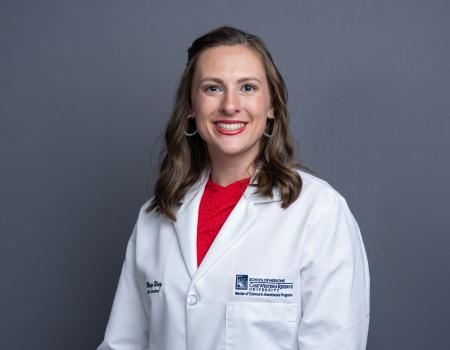
School of Medicine
From driving cutting-edge research to bringing medical innovations to market, landing competitive awards and more, the faculty, staff and students at Case Western Reserve University School of Medicine know how to make headlines.

Hero Type
Image
J. Alan Diehl receives the Case Medal for Excellence in Health Science Innovation
When J. Alan Diehl arrived at Case Western Reserve University in 2019, the Department of Biochemistry in the School of Medicine was at a crossroads—ready for a renewed sense of purpose and direction. Six years later, under Diehl’s leadership as chair, the department’s faculty headcount has more…
In the News
Recent News
December 18, 2012
Researchers at Case Western Reserve University School of Medicine have identified a molecule linked to more aggressive forms of breast cancer—a discovery that could point the way to potential cures. Until this study, the ribonucleic acid (RNA) molecule called miR-181a had never before been tied to…
December 17, 2012
CLEVELAND - Researchers at Case Western Reserve University School of Medicine have identified a molecule linked to more aggressive forms of breast cancer – a discovery that could point the way to potential cures. Until this study, the ribonucleic acid (RNA) molecule called miR-181a had never…
December 11, 2012
CLEVELAND - Case Western Reserve University School of Medicine and AstraZeneca, a global biopharmaceutical company, today announced the first patient enrolled in a Phase 2a trial to assess the effectiveness of AZD5847, a new test drug for patients with tuberculosis (TB), including patients with HIV…
December 05, 2012
CLEVELAND - Case Western Reserve University School of Medicine announced that it will receive funding through the Achieving Healthy Growth program within the Grand Challenges in Global Health initiative. This initiative was launched by the Bill & Melinda Gates Foundation to overcome persistent…
November 19, 2012
CLEVELAND - Researchers at Case Western Reserve University School of Medicine have identified a genetic factor that prevents blockages from forming in blood vessels, a discovery that could lead to new therapies for cardiovascular diseases. The findings are described in the Nov. 19 issue of…
November 16, 2012
The Case Western Reserve University School of Medicine has received a significant gift from Constance and James W. Brown of Chagrin Falls, President Barbara R. Snyder announced Thursday evening. The gift will help fund a new medical education and research building and headquarters for the School of…
November 09, 2012
CLEVELAND - The Eye Bank Association of America (EBAA), the nation’s oldest transplant association, has chosen Jonathan Lass, MD, for the 2012 R. Townley Paton Award for his work on corneal preservation and his 30-plus-year career as an ophthalmologist and medical educator. Lass is the Charles I…
October 12, 2012
CLEVELAND - Led by a grant from the National Science Foundation (NSF), Mark Chance, PhD, director of the Center for Proteomics and Bioinformatics at Case Western Reserve University School of Medicine, has been awarded $4 million for work with the National Synchrotron Light Source II (NSLS II) at…
October 09, 2012
CLEVELAND - Magnesium sulfate is given to many pregnant women to treat preterm labor and preeclampsia and was recently shown to prevent cerebral palsy; however little is known about how it works. Researchers at Case Western Reserve University School of Medicine recently discovered the mechanism by…
October 04, 2012
A promising study out in the Journal of Neurosciences showed that in a mouse model of Rett syndrome, researchers were able to reverse abnormalities in brain activity and improve neurological function by treating the animals with an FDA-approved anesthesia drug, ketamine. Rett syndrome is among the…








